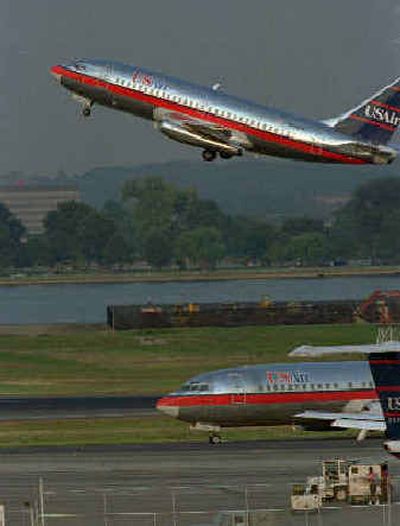Government debates airlines’ future

Amid the airline industry’s worst financial downturn, the federal government is poised to play its biggest role in the industry since deregulation in 1978.
Decisions by federal officials — some this election year — are expected to help shape the future of the industry, now in its fourth year of multibillion-dollar losses.
For the industry, those decisions might help determine which carriers survive and which become takeover targets - or simply fade away. For consumers, the decisions could affect whether their hometown gains or loses air service, and how much they’ll pay for air travel.
“Over the next few months and years, the government’s intervention or absence of intervention could substantially alter the industry,” says Washington-based aviation adviser Jon Ash, who has followed the industry for 30 years.
On the transportation docket:
• Loan guarantees. A three-member federal panel is weighing whether United Airlines will get a $1.6 billion federal loan guarantee. The No. 2 carrier says it needs the guarantee to emerge from bankruptcy reorganization and survive.
• Foreign ownership. In talks with the European Union, U.S. negotiators are under pressure to raise to 49 percent the voting stake a foreign carrier can have in a U.S. airline. The current limit is 25 percent. The change would encourage the flow of capital into U.S. airlines. It also could lead foreign investors to start carriers here.
• Mergers. With most big airlines hemorrhaging cash, antitrust officials at the Justice Department might be drawn again into an airline acquisition proposal. The most likely takeover candidate is No. 7 US Airways. In 2001, Justice blocked United’s bid to buy the Arlington, Va.-based carrier.
Each decision is fraught with controversy. Big airlines say their financial messes result in part from the Sept. 11 terrorist attacks. United and American each lost two jets that day. The drop in air travel that followed slammed the whole industry.
Furthermore, airlines say, the deregulation that freed them 25 years ago to compete on fares and routes did little to remove government from their daily lives. They say they’re burdened by constraints on mergers, by federal taxes and by other demands other industries don’t face.
“This industry is not genuinely deregulated,” says United Airlines CEO Glenn Tilton. The former vice chairman of ChevronTexaco, Tilton saw huge mergers transform the oil industry. The airline industry, he says, “needs a thorough policy review.” Some say the time has come for government to step aside and let the free market rule. That would lead to a natural restructuring of the industry.
“Getting rid of some carriers would be a good thing” for consumers, says economist Clifford Winston of the Brookings Institution.
Continental Airlines CEO Gordon Bethune said recently it’s “foolish” to believe all six traditional hub-and-spoke carriers — American, United, Delta, Continental, Northwest and US Airways — will survive. “You don’t need six of those networks.”
Others say airlines are too crucial to international trade, commerce, defense and U.S. standing in the world for government to do nothing while the industry suffers wrenching changes. “The government could just step back and let things happen,” says consultant Mark Gerchik, deputy assistant Transportation secretary for aviation in the Clinton administration, “but airlines are too important.”